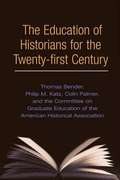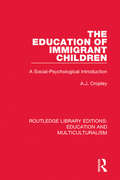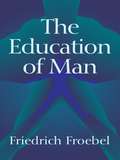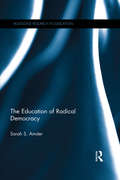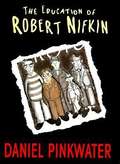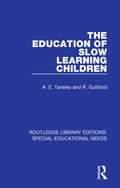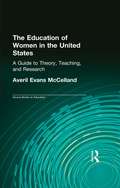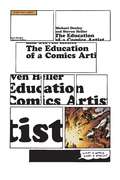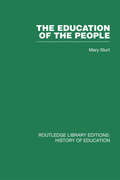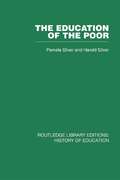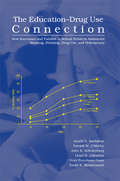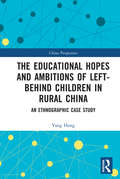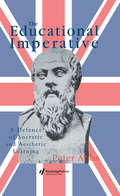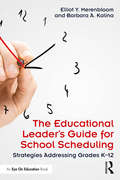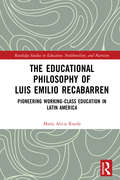- Table View
- List View
The Education of Gifted Children
by David HopkinsonFirst Published in 1978. Routledge is an imprint of Taylor & Francis, an informa company.
The Education of Historians for Twenty-first Century
by Thomas Bender Colin A. Palmer Philip F. KatzIn 1958, the American Historical Association began a study to determine the status and condition of history education in U.S. colleges and universities. Published in 1962 and addressing such issues as the supply and demand for teachers, student recruitment, and training for advanced degrees, that report set a lasting benchmark against which to judge the study of history thereafter. Now, more than forty years later, the AHA has commissioned a new report. The Education of Historians for the Twenty-first Century documents this important new study's remarkable conclusions. Both the American academy and the study of history have been dramatically transformed since the original study, but doctoral programs in history have barely changed. This report from the AHA explains why and offers concrete, practical recommendations for improving the state of graduate education. The Education of Historians for the Twenty-first Century stands as the first investigation of graduate training for historians in more than four decades and the best available study of doctoral education in any major academic discipline. Prepared for the AHA by the Committee on Graduate Education, the report represents the combined efforts of a cross-section of the entire historical profession. It draws upon a detailed review of the existing studies and data on graduate education and builds upon this foundation with an exhaustive survey of history doctoral programs. This included actual visits to history departments across the country and consultations with scores of individual historians, graduate students, deans, academic and non-academic employers of historians, as well as other stakeholders in graduate education. As the ethnic and gender composition of both graduate students and faculty has changed, methodologies have been refined and the domains of historical inquiry expanded. By addressing these revolutionary intellectual and demographic changes in the historical profession, The Education of Historians for the Twenty-first Century breaks important new ground. Combining a detailed historical snapshot of the profession with a rigorous analysis of these intellectual changes, this volume is ideally positioned as the definitive guide to strategic planning for history departments. It includes practical recommendations for handling institutional challenges as well as advice for everyone involved in the advanced training of historians, from department chairs to their students, and from university administrators to the AHA itself. Although focused on history, there are lessons here for any department. The Education of Historians for the Twenty-first Century is a model for in-depth analysis of doctoral education, with recommendations and analyses that have implications for the entire academy. This volume is required reading for historians, graduate students, university administrators, or anyone interested in the future of higher education.
The Education of Immigrant Children: A Social-Psychological Introduction (Routledge Library Editions: Education and Multiculturalism #3)
by A. J. CropleyOriginally published in 1983. This book concentrates on the psychological factors within immigrants and on the importance of these for relations with locals and for education. It argues that immigrants experience a state of estrangement from both their own societies and from the receiving society. The educational effects of this manifest themselves partly in poor achievement, partly in poor behaviour and in dropping out of society. These are seen as the results of a diminished self-worth, a feeling of being pre-programmed to failure, and of being outsiders. This study develops a psychological model of the state of affairs and of the desirable educational measures needed for coping with it – in educational planning, curriculum development, teacher training and so on. It presents guidelines or suggestions for areas and kinds of actions, not presentating specific materials or programmes. This book fosters development of insight and understanding among teachers, policy-makers, teacher trainers and immigrants themselves.
The Education of Indigenous Citizens in Latin America
by Regina CortinaThis groundbreaking volume describes unprecedented changes in education across Latin America, resulting from the endorsement of Indigenous peoples' rights through the development of intercultural bilingual education. The chapters evaluate the ways in which cultural and language differences are being used to create national policies that affirm the presence of Indigenous peoples and their cultures within Mexico, Ecuador, Peru, Bolivia and Guatemala. Describing the collaboration between grassroots movements and transnational networks, the authors analyze how social change is taking place at the local and regional levels, and they present case studies that illuminate the expansion of intercultural bilingual education. This book is both a call to action for researchers, teachers, policy-makers and Indigenous leaders, and a primer for practitioners seeking to provide better learning opportunities for a diverse student body.
The Education of Man
by Friedrich Froebel W. N. HailmannIn this classic of childhood education, Friedrich Froebel identifies the fundamental principles upon which he based his now-ubiquitous kindergarten system. Froebel demonstrates how to channel child's play and integrate it into the development of intelligence and social skills, explaining the vital inner connection between the pupil's mind and the subject of study.Impressed by the theories of Johann Heinrich Pestalozzi, Froebel developed an approach to early childhood education that exercised enormous influence over modern techniques, particularly those of John Dewey. Froebel espoused "self-activity" and play as essential factors in preschool education, maintaining that the teacher's role is not to drill or indoctrinate but to encourage self-expression through play. His method banishes mechanical and rote activities in favor of creative play, which fosters the growth of artistic capacity.Originally published in Germany in 1826 as Die Menschenerziehung, this volume constitutes one of the most important books on education ever written.
The Education of Man: Aphorisms
by Johann Heinrich PestalozziTimeless words of wisdom from the eighteenth-century teacher who transformed the world of education with his groundbreaking ideas. Johann Heinrich Pestalozzi rose to prominence during the Age of Enlightenment, bringing the spirit of equal opportunity and respect for human personality into the classroom, just as Thomas Jefferson imbued such virtues into the Declaration of Independence. The foundation of Pestalozzi&’s educational philosophy rested on six principles: the inner dignity of the individual; the promise of potential in each child; love as the basis of education (as opposed to punishment); his doctrine of Anschauung, experience-based learning; appropriate action following Anschauung, and an emphasis on repetition of said action. This philosophical grounding influenced the great remaking of American education from 1830 to 1860, resulting in changes that have been felt through the centuries and remain relevant today. The Education of Man gathers Pestalozzi&’s enduring thoughts on subjects as wide-ranging as humanity, teaching, poverty, justice, truth, and nature, including such observations as . . . People are led by custom and catchwords, but facts they are wont to overlook. The man who seeks to rule as a father before he has learned to love as a brother will never be a patriarch. Sooner or later, but of a certainty in the end, Nature will take her toll for what men do against her. Learning is not worth a penny when courage and joy are lost along the way. The world grows poor in seeking to avoid poverty; the man who strives for riches most earnestly is seen to be the poorest.
The Education of Mary: A Little Miss of Color, 1832
by Ann RinaldiIn 1832, Prudence Crandall begins admitting black girls to her exclusive Connecticut school, scandalizing white society and eventually causing her arrest and the closing of her school.
The Education of Migrant Children and China's Future: The Urban Left Behind (Routledge Studies in Asia's Transformations)
by Holly H. MingThere are more than 225 million rural-to-urban migrant workers, and some 20 million migrant children in Chinese cities. Because of policies related to the household registration (hukou) system, migrant students are not allowed a public high school education in the cities, so their urban education stops abruptly at the end of middle school. This book investigates the post-middle school education and labor market decisions of migrant students in Beijing and Shanghai, and provides a glimpse into the future of a crucial link in China’s development. The stories of how these migrant students seek upward mobility and urban citizenship also reveal one of the most intricate structural inequalities in China today. Based on quantitative data collected from middle schools in Beijing and Shanghai, and ethnographic data drawing on in-depth interviews with migrant children, their parents, and teachers, this book offers a portrait of the migration and educational experiences and prospects of second generation migrant youth in China today. It explores the urban experience of migrant students, contrasting it with that of local city youngsters, examining the migrant students’ family backgrounds, family dynamics, neighborhood and school experience, and interaction with locals. It goes on to look at the migrant students’ education and career aspirations, the structural obstacles preventing their fulfilment, and how migrant families respond to institutional constraints on educational opportunity. Finally, the book concludes with a discussion of policy implications and offers proposals for resolving the dilemmas of migrant youth. This book will of great interest to students and scholars of Chinese studies, Asian education, migration and social development.
The Education of Radical Democracy (Routledge Research in Education)
by Sarah S. AmslerThe Education of Radical Democracy explores why radical democracy is so necessary, difficult, and possible and why it is important to understand it as an educative activity . The book draws on critical social theory and critical pedagogy to explain what enables and sustains work for radical democratization, and considers how we can begin such work in neoliberal societies today. Exploring examples of projects from the nineteenth century to the present day, the book sheds light on a wealth of critical tools, research studies, theoretical concepts and practical methods. It offers a critical reading of the ‘crisis of hope’ in neoliberal capitalist societies, focusing on the problem of the ‘contraction of possibilities’ for democratic agency, resistance to domination, and practices of freedom. It argues that radically democratic thinking, practice, and forms of social organization are vital for countering and overcoming systemic hegemonies and that these can be learned and cultivated. This book will be of interest to academics, practitioners, researchers, and students in education and critical theory, and to those interested in the sociology, philosophy and politics of hope. It also invites new dialogues between theorists of neoliberal power and political possibility, those engaged in projects for radical democratization, and teachers in formal and informal educational settings.
The Education of Robert Nifkin
by Daniel PinkwaterSet in the 1950s in Chicago, Robert Nifkin tells his highly unorthodox high school experiences in the form of a college application essay.
The Education of Slow Learning Children (Routledge Library Editions: Special Educational Needs #53)
by A. E. Tansley R. GullifordOriginally published in 1960. The authors of this text examine ways in which both ordinary schools and special needs schools can further develop suitable education for pupils with special needs, including improved post-school guidance. This title aims to provide a guide to teachers in deciding the aims of their teaching and to assist in the planning of their teaching methods.
The Education of Women in the United States: A Guide to Theory, Teaching, and Research (Labor in America #Vol. 23)
by Averil Evans McClellandFirst Published in 1992. Routledge is an imprint of Taylor & Francis, an informa company.
The Education of Young Children (Routledge Revivals)
by D.E.M. GardnerFirst published in 1956, The Education of Young Children is focused on presenting the psychological needs of children within education, following several talks given by the author at conferences for teachers of young children. The book highlights the importance of meeting all aspects of a child’s needs. It demonstrates that physical, emotional, social, and intellectual needs are all intrinsically connected and fundamental to education and development. It also puts forward the significance of Nursery Schools and the training given to Nursery School teachers, as well as the influence of Nursery Schools on Infant Schools. The Education of Young Children will appeal to those with an interest in the history and psychology of education.
The Education of a Comics Artist: Visual Narrative in Cartoons, Graphic Novels, and Beyond
by Steven Heller Michael DooleyFeaturing essays by, and interviews with, more than sixty professionals, educators, and critics, the book provides an in-depth view of the art, business, and history of comics art. Readers will learn about a wide variety of genres, from editorial cartoons, political comics, and comic strips to graphic novels, superhero sagas, and alternative comics. Other featured topics include the role of comic art in related fields such as animation, design, and illustration; lesson plans by top teachers; and essays on how to thrive and grow as a creative comic artist.
The Education of a Photographer
by Steven Heller Charles TraubIdeal for art students at every level Illuminating words about creating great images Published in association with New York's School of Visual Arts. What does it mean to become a photographer in the twenty-first century? This thoughtful collection of essays illuminates the spirit of the people who make the indelible images of our times. Aspiring and professional photographers-especially those in arts programs throughout the United States-will appreciate the comprehensive vision of The Education of a Photographer. Classic writings from the twentieth century as well as the thoughts of the most influential talents working today, plus essays from designers, editors, and gallery owners, make this a compelling look at what drives and inspires photographers to create great work.
The Education of the People: A History of Primary Education in England and Wales in the Nineteenth Century
by Mary SturtOriginally published in 1967.This book illustrates how, during the nineteenth century, the idea grew up that the provision of universal education was one of the functions of the state. The volume is also a history of that period of education, discussing the main events and describing the actual conditions of the schools.
The Education of the Poor: The History of the National School 1824-1974
by Harold Silver Pamela SilverOriginally published 1974. Thousands of elementary schools for the children of the poor were founded during the nineteenth century, yet there is scarcely a published history of a single one of them. This volume is precisely such a history and the authors trace its story against the background of local and national change in education and society. On the basis of a unique collection of records the authors have pieced together a picture of the social composition of the school, its curriculum and teaching methods, and its administration and finance. They relate the history of the school to that of London and the church, to that of educational authorities and educational policy.
The Education-Drug Use Connection: How Successes and Failures in School Relate to Adolescent Smoking, Drinking, Drug Use, and Delinquency
by Jerald G. Bachman Patrick M. O'Malley John E. Schulenberg Lloyd D. Johnston Peter Freedman-Doan Emily E. MessersmithDoes success in school protect teenagers from drug use? Does drug use impair scholastic success? This book tackles a key issue in adolescent development and health - the education-drug use connection. The authors examine the links and likely causal connections between educational experiences, delinquent behavior, and adolescent use of tobacco, alco
The Educational Hopes and Ambitions of Left-Behind Children in Rural China: An Ethnographic Case Study (China Perspectives)
by Yang HongThis monograph highlights the educational experiences of rural children who are 'left behind' by their migrant worker parents in China, analyzing how this situation impacts on their aspirations and self-identity. Via an ethnographic and qualitative case study of a rural school in southwest China, the author presents the real lives of these disadvantaged children along with their challenges and needs, and provides an in depth understanding of how being ‘left behind’ impacts on their future aspirations. Building on the sociological theories of Pierre Bourdieu, the author makes an original contribution by combining seemingly incompatible disciplinary perspectives, such as cultural capital from sociology, rational action from behavioral economics, and self-efficacy from psychology. Hence, the book endeavors to transfer these Western theories to an Eastern context and demonstrates cultural nuances that are not always captured when applied in the West. The book will attract academic scholars and postgraduate students in the area of socially disadvantaged children and young people as well as those who are working on youth studies and rural education.
The Educational Ideas of Charles Fourier: 1772-1837 (Routledge Revivals)
by David ZeldinOriginally published in 1969, this book aims to show that Charles Fourier has much to say that is of interest to modern edcationlists. Fourier hardly ever figures in histories of education because only recent developments in educational practice have shown his ideas to be of topical and practical importance to the schoolteacher and the planner of today. Fourier devised a system of education to suit a self-infulgent, democratic society, in which children's energies could be used in ways which were both socially useful and personally rewarding. He was a pioneer advocate of comprehensive education, so as to establish harmy between classes. He urged vocational training and guidance, so as to establish harmony between men and their work. He devised close links between education and industry, to bring pleasure into both school and work and to integrate the two. He was one of the first to plan social service to the community by children. This prophetic though eccentric writer, sometimes extravagant, often amusing, but always endearing, who has already exerted much influence on socialist theory, deserves to be better known by students of education.
The Educational Imagination: On the Design and Evaluation of School Programs
by Elliot W. EisnerThis paperback reprint of the 1994 edition is a highly regarded curriculum development book by one of the most prominent figures in the field. It is designed to help readers understand the major approaches to curriculum planning and the formation of educational goals. In this edition, Eisner provides a conceptual framework that shows learners the different ways in which the aims of education can be regarded. . . and, describes their implications for curriculum planning and teaching practices. Coverage is grounded in the belief that the appropriateness of any given educational practice is dependent upon the characteristics and context of the school program, and the values of the community that program serves. Chapter titles include: Schooling in America: Where Are We Headed; Some Concepts, Distinctions, and Definitions; Curriculum Ideologies; The Three Curricula That All Schools Teach; Educational Aims, Objectives, and Other Aspirations; Dimensions of Curriculum Planning; On the Art of Teaching; The Functions and Forms of Evaluation; Reshaping Assessment in Education; Some Examples of Educational Criticism; and A Criticism of an Educational Criticism. For teachers and anyone else involved in planning educational curriculums.
The Educational Imperative: A Defence Of Socratic And Aesthetic Learning
by Peter AbbsWritten with both the cultural and moral crisis and the challenge of the future in mind, Peter Abbs's book charts an open, clear, and positive way forward for education. Divided into four sections, the first examines the true and fitting ends of education and outlines a positive conception of education as an initiation into critical enquiry and the personal art of learning. The two middle sections consider aesthetic education. Abbs confronts government approaches to arts teaching and offers an alternative dynamic paradigm within which the creativity of the culture transmitted down the ages and the creativity of the individual seen as biologically given must be combined. The outcome of this is explored, in detail, in relation to the teaching of literature, creative writing and drama. The final section offers critical appraisals of influential figures in the arts field:; Herbert Reid, the late Peter Fuller and David Holbrook.
The Educational Leader's Guide for School Scheduling: Strategies Addressing Grades K–12
by Elliot Y. Merenbloom Barbara A. KalinaThe Educational Leader’s Guide for School Scheduling: Strategies Addressing Grades K–12 is the first publication to address creative scheduling at all levels: K–5 or 6, K–8, middle, and high schools. This essential resource provides strategies for the effective and equitable distribution of available FTEs throughout the district, while helping you work through the many critical questions and decisions involved in the scheduling process. Based on the authors' decades of experience in expressing the voice of classroom teachers and building administrators in the art of scheduling, each chapter addresses key schedule development issues, providing a step-by-step sequence, multiple tables, templates, and example schedules. Follow the models in this book to master the skills of producing an efficient organizational plan for your school!
The Educational Philosophy of Luis Emilio Recabarren: Pioneering Working-Class Education in Latin America (Routledge Studies in Education, Neoliberalism, and Marxism)
by María Alicia RuedaThis text offers a unique philosophical and historical inquiry into the educational vision of Luis Emilio Recabarren, and his pivotal role in securing independent education for Chile’s working classes in the early 20th century. Through close analysis of the textual archives and press writings, The Educational Philosophy of Luis Emilio Recabarren offers comprehensive insight into Recabarren’s belief in education as essential to the empowerment, emancipation, and political independence of the working class, and emphasises the importance he placed on the education of workers through experiential learning in their organizations and press. By situating his work amongst broader political and educational movements occurring in Latin America in an era of imperialism, the text also demonstrates the progressive nature of Recabarren’s work and maps the development of his philosophy amid Socialist, Marxist, and Communist movements. Making an important contribution to our understanding of the aims and value of adult education in light of neoliberalism today, this text will be of interest to scholars, researchers, activists, and post-graduate students with an interest in education, social movements, and Latin America. The text also addresses key issues raised in studies of Recabarren and the history of education in Chile.

